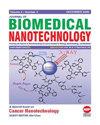Heat-Shock Protein 4 (HSP-4) Promote Renal Cell Carcinoma Metastasis via Negatively Regulating KLF6
IF 2.9
4区 医学
Q1 Medicine
引用次数: 0
Abstract
This project investigates the role and mechanisms of HSP4 and KLF6 in renal clear cell carcinoma (RCC) metastasis at molecular, cellular, and clinical levels. HSP4 expression was analyzed in RCC tissue specimens, cell lines, and its relationship with clinicopathological indicators. RCC cell lines with elevated HSP4 were transfected with HSP4 knockdown vectors, and the impact on cell invasion was assessed. The interaction between HSP4 and KLF6 was confirmed through luciferase assays and cell experiments. HSP4 expression was significantly higher in RCC tissues and cell lines compared to normal samples. Higher HSP4 levels were associated with increased metastasis incidence in RCC patients. HSP4 knockdown suppressed cell migration. Luciferase assays showed that HSP4 targets KLF6. KLF6 mRNA levels were inversely correlated with HSP4 in RCC tissues. Knockdown of HSP4 increased KLF6 levels, and vice versa, indicating a negative correlation. Inhibition of KLF6 counteracted the inhibitory effect of HSP4 knockdown on RCC cell functions. In conclusion, elevated HSP4 expression is linked to lymph node and distant metastasis in RCC patients. HSP4 likely promotes RCC progression by negatively regulating KLF6, offering insights into RCC-specific biomarkers and its pathogenesis.热休克蛋白 4 (HSP-4) 通过负调控 KLF6 促进肾细胞癌转移
该项目从分子、细胞和临床层面研究了HSP4和KLF6在肾透明细胞癌(RCC)转移中的作用和机制。分析了HSP4在RCC组织标本、细胞系中的表达及其与临床病理指标的关系。用HSP4敲除载体转染HSP4表达升高的RCC细胞系,并评估其对细胞侵袭的影响。通过荧光素酶测定和细胞实验证实了HSP4和KLF6之间的相互作用。与正常样本相比,HSP4在RCC组织和细胞系中的表达明显较高。较高的HSP4水平与RCC患者转移发生率的增加有关。HSP4基因敲除抑制了细胞迁移。荧光素酶测定显示,HSP4靶向KLF6。在RCC组织中,KLF6 mRNA水平与HSP4成反比。敲除HSP4会增加KLF6的水平,反之亦然,表明两者呈负相关。抑制 KLF6 可以抵消 HSP4 敲除对 RCC 细胞功能的抑制作用。总之,HSP4表达的升高与RCC患者的淋巴结和远处转移有关。HSP4可能通过负调控KLF6来促进RCC的进展,这为RCC特异性生物标志物及其发病机制提供了启示。
本文章由计算机程序翻译,如有差异,请以英文原文为准。
求助全文
约1分钟内获得全文
求助全文
来源期刊
CiteScore
4.30
自引率
17.20%
发文量
145
审稿时长
2.3 months
期刊介绍:
Information not localized

 求助内容:
求助内容: 应助结果提醒方式:
应助结果提醒方式:


